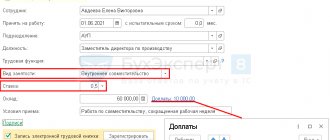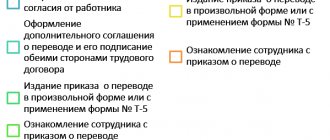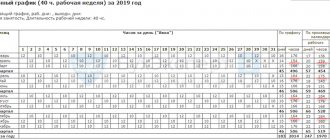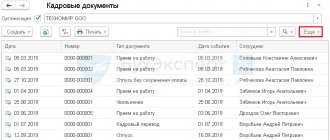The Labor Code of the Russian Federation allows for the possibility of employment for additional work. An employee can perform additional duties simultaneously with his main job or in his free time. Depending on this, the employer and the employee formalize a part-time job (internal or external) or combination.
This article will discuss internal part-time work, its differences from part-time work, and the correct registration of an employee for additional work in accordance with current legislation.
Part-time work: concept and types
Quite often, an enterprise has employees registered as part-time workers.
Part-time work means that an employee works in one organization in the main position, and at the same/another enterprise performs some regular type of activity in his free time (Article 282 of the Labor Code of the Russian Federation). The key words in this case are “free time” and “regularity”.
Part-time work can be:
- external (main and additional work is performed in different organizations);
- internal (additional work is performed in the same organization as the main one).
Registration of a full-time employee as a part-time employee is often more profitable for the employer than searching for and hiring an applicant (despite the fact that he may refuse this job even after completing his training). Workers also benefit from the institution of part-time work, as it allows them to receive additional income.
The specificity of part-time employment is that the conditions of such work are made dependent on the applicant’s main job for the position. That is, if the applicant does not have a main job, then he cannot be hired for a part-time job.
In Art. 60.1, 66, 68, 282 - 288 of the Labor Code of the Russian Federation do not provide for any restrictions related to the number of registrations for a part-time worker. That is, you can apply for a part-time job as many times as necessary (depending only on desire and strength).
Part-time work in the Labor Code of the Russian Federation
It is worth noting that part-time work is considered to be the ability to perform work functions in one’s free time. Part-time work is regulated at the level of the Labor Code of the Russian Federation. Here are the basic principles for the application of this type of labor relations. In particular, the law establishes the following points:
- definition of terminology, general principles of part-time work;
- a list of documents that must be presented at the time of part-time employment;
- how long should a citizen work part-time;
- issues of payment for time worked;
- the procedure for registration and duration of leave for a part-time worker;
- a list of basic compensations and guarantees for employees whose work is carried out part-time;
- a list of additional conditions under which an employment relationship with a part-time employee can be terminated.
It should be noted that the Labor Code of the Russian Federation establishes only basic principles. In the future, they are detailed and explained at the level of government regulations and ministerial orders. The specific working conditions of each worker are reflected in the employment contract.
Remember, the employer can improve, in comparison with the Labor Code of the Russian Federation, the terms of cooperation with a part-time worker. At the same time, a reduction in social guarantees, even if the parties have mutually agreed on this, is not allowed.
Internal part-time and combination: what is the difference
Very often the concepts of “internal part-time work” and “combination” are confused, considering them synonymous. In fact, these are two different options for designing additional work.
Article 60 of the Labor Code of the Russian Federation prohibits requiring an employee to perform duties not stipulated by his employment contract. Therefore, if an employer requires an employee to expand the range of his duties, perform work in a different profession, or replace a temporarily absent employee, then the legislation provides two options for registering additional work for an already registered employee: part-time or part-time work.
Part-time work represents the full performance of duties by an employee with the mandatory conclusion of an employment contract (Article 60.1 of the Labor Code of the Russian Federation). In this case, additional work is performed regardless of the main duties in the time free from the main job. Part-time work is regulated by Chapter 44 of the Labor Code of the Russian Federation. The procedure for part-time work for teachers and doctors has certain features; it is determined by regulations of the Government of the Russian Federation for each category of these persons.
Part-time employment is issued for vacant positions. After registration, the part-time worker is assigned an independent personnel number. Keeping records of the working hours of a part-time employee and the main position is carried out separately.
If the employer finds another employee for a part-time position, for whom this work will be the main one, then he can fire the part-time employee. This right of the employer is provided for in Art. 288 Labor Code of the Russian Federation. In this case, the part-time partner must be notified 2 weeks before the date of termination of the contract.
Internal combination is the performance by an employee of an organization of additional duties without interruption from his main job. In this case, new work is performed for the same (increase in the volume of work) or related (expansion of responsibilities) position within the framework of one employment contract. For combination, it is not necessary to have vacant positions; it can also be registered for an occupied position (for example, during the absence of the main employee). The possibility of combination must be provided for in a collective agreement or other local act of the organization. on the time sheet .
For greater clarity, let us combine the distinctive features of internal part-time and combination in the table.
The story of one dispute: the transition from part-time work to the main job and full-time
This article is written based on a real civil case involving a labor dispute. A brief background that can be called typical is this: the employee and the employer (university) have been on good terms for 20 years. The employee climbed the career ladder, starting from an ordinary employee and ending with the chair of the deputy head of the organization, and at one moment everything changed dramatically. Naturally, not without reason. A university merger program has begun, which has been discussed in the media for a long time. And now the “X” moment has come. The parties saw the further fate of the legal entity itself differently. The head of the organization went with the flow, and the employee, on the contrary, tried as best he could to maintain the activities of the legal entity. Naturally, the employer did not like this, and then it was decided to get rid of the employee in all possible and impossible ways. The employer had no legal grounds for terminating the employment relationship, so they began to use various discriminatory methods to survive the employee. But the employee did not simply give up and went to court to protect his rights.
EMPLOYEE'S POSITION IN COURT
The employee (Plaintiff) worked at the university (Defendant) until 2011 as a vice-rector under fixed-term employment contracts concluded for one year. In addition, since 2008, the Plaintiff, having gone through the election procedure, worked as the head of the department, for which an employment contract was concluded, which stipulated that the work was an intra-university part-time job, and indicated the validity period of the contract. In 2010, the Plaintiff passed elections and, by decision of the academic council of the university, was elected head of the department at 0.5 rate for a period of five years, until 2015.
In May 2011, the main employment contract (for the position of vice-rector) expired, a new employment contract was not concluded with the Plaintiff, they issued a work book and an order to terminate the employment contract.
At the same time in May, the Plaintiff wrote an application for her transfer from an internal part-time job to the head of the department as her main place of work at one rate. The employer refused and offered to resign and then conclude a new employment contract for 0.5 times the rate of the position of head of the department until the end of 2012.
Until July 2012, the Plaintiff repeated similar statements twice, but the employer’s answer was the same: the Plaintiff must resign, and then a new employment contract will be concluded with her. This was undesirable for the Plaintiff.
In June 2012, the Plaintiff received from the Defendant a written proposal to conclude an agreement for one pay rate for the position of head of the department at the main place of work, but with the condition that the Plaintiff undergo new elections before December 2011. Also in this proposal it was indicated that the Plaintiff needed to contact the department personnel for dismissal from work on a part-time basis and concluding an agreement at the main place of work.
Considering that there had already been a previous employment relationship between the parties, the Plaintiff considered the Defendant’s demand to re-run the elections for the position as illegal. Having appeared at the personnel department on the day of receipt of the specified offer, the Plaintiff wrote a statement with a request to conclude an additional agreement with her for one position as head of the department. In response, the Plaintiff received a second written invitation to work under the same conditions: dismissal and re-election.
The Plaintiff considered the employer’s demands to be illegal and asked the court to oblige the Defendant to amend the employment contract indicating the main place of work from June 2011, to recover unpaid wages based on the tariff rate in force for employees registered with an employment contract at the main place of work (full time). ), also to recover legal costs and compensation for moral damage.
EMPLOYER DISAGREES
The Defendant objected to the satisfaction of the claims and explained that in order for the Plaintiff to be registered in her position as her main place of work, her dismissal and the conclusion of a new employment contract must be preceded by new elections and a decision of the academic council.
The Claimant's arguments about working full-time in the period from May to July 2011 do not comply with both the terms of the contract and the time sheet, individual work plan for 2010/2011, and pay slips.
As derivatives, claims for compensation for moral damage and legal expenses are not subject to satisfaction.
RATIONALE FOR THE COURT'S POSITION
In accordance with Art. 16 of the Labor Code of the Russian Federation, labor relations arise between an employee and an employer on the basis of an employment contract concluded by them in accordance with the Labor Code of the Russian Federation.
According to Art. 21 of the Labor Code of the Russian Federation, an employee has the right to conclude, amend and terminate an employment contract in the manner and under the conditions established by the Labor Code of the Russian Federation and other federal laws.
By virtue of Art. 60.1 of the Labor Code of the Russian Federation, an employee has the right to enter into employment contracts to perform other regular paid work with the same employer (internal part-time job) and (or) with another employer (external part-time job) during his free time from his main job.
By virtue of Art. 64 of the Labor Code of the Russian Federation prohibits unreasonable refusal to conclude an employment contract. Any direct or indirect restriction of rights or establishment of direct or indirect advantages when concluding an employment contract depending on gender, race, skin color, nationality, language, origin, property, social or official status, age, place of residence, as well as other circumstances not related to the business qualities of employees are not allowed, except in cases provided for by federal law. Refusal to conclude an employment contract can be appealed in court.
At the court hearing, it was established that the Plaintiff worked for the Defendant under an employment contract dated 2008 as a professor of the department at 0.5 rate on an internal part-time basis.
By an additional agreement to the employment contract of 2009, she was transferred to the position of head of the department for the period until August 2010, while maintaining the type of work - part-time at a rate of 0.5 of the basic salary. The validity period of the agreement is determined by the parties - from February 2008 to December 2012.
By decision of the academic council in 2010, the Plaintiff was elected to the position of head of the department at 0.5 rate for a period of five years (until 2015). The Plaintiff’s repeated requests to renew the employment contract in connection with the newly occupied position were refused by the Defendant, citing the need to fire the Plaintiff and then conclude a new contract.
By virtue of Art. 67 of the Labor Code of the Russian Federation, an employment contract is concluded in writing, drawn up in two copies, each of which is signed by the parties.
An employment contract that is not formalized in writing is considered concluded if the employee began work with the knowledge or on behalf of the employer or his representative. When an employee is actually admitted to work, the employer is obliged to draw up an employment contract with him in writing no later than three working days from the date the employee is actually admitted to work.
The letter of Rostrud dated October 22, 2007 No. 4299-6-1 provides the procedure for making changes to work books in the event that an employee performs part-time job functions with a subsequent transfer to the main place of work.
So, if in the employee’s work book there is an entry about part-time work, made at one time at the main place of work, then after recording the dismissal from the main place of work, an entry should be made in the work book stating that the previously performed part-time work has become basic.
As follows from the case materials, the Claimant has a corresponding record of dismissal from her previous place of work, which was her main place, however, the position she holds and the job functions she performs are not indicated as her main place of work.
Contrary to the above-mentioned provisions of labor legislation, the Defendant did not properly formalize the employment relationship with the Plaintiff, while in fact the Plaintiff was allowed to work in an elective position and performed all its inherent functions, including working hours. This fact could not serve as a basis for the Defendant to refuse the employee to draw up a contract on the conditions actually fulfilled by him and the labor functions he performs.
The Defendant made a written offer to the Plaintiff to conclude an employment contract with her for one pay position as head of the department at the main place of work, the Plaintiff agreed to this proposal, therefore, the employer had an obligation to conclude an employment contract with the Plaintiff on the specified conditions. The Defendant’s demands for the need to fire the Plaintiff and hold repeat elections cannot be considered based on the law.
Note! The employer’s arguments about the lack of proof of the employee’s work in full working mode, inherent in the main type of work, with reference to internal departmental local acts (working time sheets, wage schedule, etc.), the court found untenable, since they were issued unilaterally without the will of the employee and actually contradict the existing relationship between the parties.
At the court hearing, it was established that the Defendant’s written proposal to conclude an employment contract with the Plaintiff for one pay rate, the Plaintiff’s consent, indicate that an agreement was reached between the Plaintiff and the Defendant to transfer the Plaintiff to work as the head of the department at the main place of work full time .
According to the Regulations on the procedure for elections to the position of head of the Department of the Respondent, this position is elective. The conclusion of an employment contract is preceded by elections. The head of the department can perform his duties on a part-time basis. The said Regulations do not provide for the holding of repeat elections when the head of the department is transferred from a part-time job to a job at the main place of work or from a 0.5-time job to a full-time job.
Of attraction
from the Labor Code of the Russian Federation
Article 72. Changes in the terms of the employment contract determined by the parties
Changing the terms of the employment contract determined by the parties, including transfer to another job, is allowed only by agreement of the parties to the employment contract, except for the cases provided for by this Code. An agreement to change the terms of an employment contract determined by the parties is concluded in writing.
Based on Art. 72 of the Labor Code of the Russian Federation, changes in the terms of the employment contract determined by the parties, including transfer to another job, are allowed only by agreement of the parties to the employment contract. The grounds for termination of an employment contract are specified in Art. 77 Labor Code of the Russian Federation. However, this article does not indicate that termination of an employment contract for the main job is grounds for termination of a part-time employment contract.
Note! Upon termination of the employment contract for the main job, the employee has the right to submit an application for transfer from a part-time job to the main place of work.
The parties had the right to enter into an additional agreement to the employment contract, which would define new terms of remuneration, new working hours and other conditions of the employment contract, which the parties wished to amend, without terminating it. Termination of the employment contract with the Plaintiff in this case was not required.
Thus, discrimination was carried out against the Plaintiff in the form of the employer’s refusal, not provided for by law, to transfer the Plaintiff to work as the head of the department at the main place of work at one pay rate.
THE COURT'S DECISION
The court decided to satisfy the Plaintiff’s claim, while obliging the Defendant to make changes to the employment contract, indicating that the Plaintiff’s work from June 2011 to August 2015 as the head of the department was the main one for one pay, and to make a corresponding entry in the Plaintiff’s work book.
In addition, the court decided to recover from the Defendant in favor of the Plaintiff unpaid wages for the period from June 2011 to March 2012 (the date of the court decision), compensation for moral damage, as well as legal expenses for the services of a representative.
Internal part-time work: limitations and features
There are categories of workers for whom part-time work is prohibited by labor legislation. In accordance with Art. 282, 329, 276 of the Labor Code of the Russian Federation it is unacceptable to hire as part-time workers:
- minors;
- persons who work in their main job with harmful (dangerous) working conditions, if part-time work will be carried out in similar conditions;
- employees of state and municipal institutions;
- persons whose main work is related to driving or moving vehicles, if the planned part-time work is similar;
- military personnel (except for such industries as pedagogy, science and creativity, provided that such part-time work will not interfere with the performance of military duties);
- security guards in relation to public service and paid work in public associations;
- judges, lawyers, prosecutors (except for such industries as pedagogy, science and creativity);
- heads of organizations without consent to part-time work from the general meeting of the organization’s participants (board of directors), from the main place of work.
Internal part-time work has a number of features:
- Internal part-time work is in fact additional work performed in free time from the main job in the same organization.
- In case of internal part-time work, a separate employment contract must be concluded between the employee and the employer (Article 282 of the Labor Code of the Russian Federation).
- Since the internal part-time worker has already been registered with this employer, he does not need to provide any documents to conclude an employment contract. An exception is a document confirming the competence of a part-time worker if the new job requires special qualifications.
- It is necessary to indicate in the employment contract and in the hiring order that it is an internal part-time worker who is being hired.
- Full-time internal part-time work is not possible.
- In case of internal part-time work, a separate time sheet is kept for the employee. This allows you to control the number of hours worked and prevent overtime (Article 91 of the Labor Code of the Russian Federation).
- An entry about part-time work in the work book is made at the request of the employee (Article 66 of the Labor Code of the Russian Federation).
Features of external part-time work
The work of external part-time workers differs significantly from internal ones. Here you will have to work for completely different employers. Sometimes these are companies unfamiliar to each other. Such employment has certain nuances:
- You can only work in your free time. This means that you physically cannot be in two jobs at the same time. Here this moment will be clearly regulated. We should also not forget about the loss of time traveling from one place of work to another.
- The norm of 50% of working time at the main place of work remains the same. This is the minimum period of time that you need to work at your first job.
- The work book is kept in only one company. Here, entries about part-time work can only be made at the request of the employee. Often the issue of recording activities is carried out by opening a second work book (this is practiced if the working hours in different companies do not match).
- In case of additional employment, in addition to the application, you will need to provide documents on education, level of qualifications (or their duly certified copies). If necessary, a health certificate. If the application indicates that the employment is part-time, you do not need to provide a work book.
- Labor is paid according to the period of time actually worked. The employee is subject to all benefits and social guarantees provided for by collective agreements of companies.
Remuneration for internal part-time workers
Remuneration for internal part-time workers is carried out in accordance with Art. 25 Labor Code of the Russian Federation.
Types of remuneration for internal part-time workers:
- time-based (proportional to working hours);
- piecework (depending on output);
- by agreement of the parties (the conditions are specified in the employment contract).
The guaranteed payment for a part-time worker is fixed in the employment contract, taking into account the wage system at the enterprise (Article 135 of the Labor Code of the Russian Federation). A part-time employee has the right to receive allowances, bonuses and other compensation and incentive payments on a general basis, if such additional payments are provided for by regulations, collective agreements and contracts, and internal regulations of the employer.
Which medical workers are not entitled to part-time work?
According to Part 5 of Art. 282 of the Labor Code of the Russian Federation, part-time work is prohibited for:
- persons under 18 years of age;
- persons whose work is associated with harmful (dangerous) working conditions, if the working conditions are the same at their main job.
Let us recall that harmful or dangerous working conditions are determined not only by the specialization of the physician or the inclusion of his profession or position in any lists and lists of hazardous industries, but also, first of all, by a special assessment of working conditions (Part 1 of Article 117 of the Labor Code of the Russian Federation). This position is shared by the Supreme Court of the Russian Federation (decision dated January 14, 2013 No. AKPI12-1570). An example of harmful working conditions could be working with high doses of ionizing radiation or with pathogens of dangerous infectious diseases.
Therefore, when hiring a part-time worker for these jobs, it is necessary to request information from his main place of work about the regime and working conditions (Article 283 of the Labor Code of the Russian Federation).
Let us note that in practice, the ban on part-time work for doctors with dangerous and harmful working conditions is often ignored, which, of course, has a negative impact, first of all, on the health of the doctors themselves.
Internal part-time work: how many bets are possible under the Labor Code of the Russian Federation
The tariff rate is included in the tariff system for differentiating wages of workers of certain categories (Article 143 of the Labor Code of the Russian Federation).
In practice, normal working hours are 8 hours per day (40 hours per week). This is the length of the working day that corresponds to the full tariff rate. At the same time, Part 1 of Art. 284 of the Labor Code of the Russian Federation establishes a limit on working hours for part-time work - no more than 4 hours a day. Consequently, in proportion, a part-time worker can be hired for no more than 0.5 of the tariff rate.
However, Part 1 of Art. 284 of the Labor Code of the Russian Federation allows that a part-time worker can work full time (shift) if he is free from performing job duties at his main place of work.
So, under standard working conditions, an internal part-time worker can only work at 1.5 times the wage rate (the full rate at the main place of work is 0.5 times the internal part-time rate).
What is part-time work? Key points
Part-time work is the performance by an employee of regular paid work under the terms of an employment contract in his free time from his main job (Article 282 of the Labor Code of the Russian Federation).
Key points when working part-time:
- The duration of the working day should not be more than 4 hours. Exceptions are possible in two cases: on a day when the employee is free from his main job and when his main job has a day off.
- labor must be paid in proportion to the time worked (Article 285 of the Labor Code of the Russian Federation)
Documents for internal part-time work and part-time work from the employee
When applying for an internal part-time job, the employee must first write an application. In principle, an application for a part-time job is not very different from the application that an employee writes when applying for a main job.
In case of internal part-time and part-time work, you do not need to present your passport and education documents to the employer again, since they have already been provided to the HR department during employment for the main job.
The only exception in this case is the employment of the main employee for additional work, which requires the presence of other qualifications.
Advantages
Combining the main place of work and part-time work allows you to enjoy certain advantages, both for the employer and the direct employee. The main positive parameters of such work include:
- the employee can count on high earnings;
- a citizen has the opportunity to develop his abilities and professional skills;
- the employer does not have to look for another person for any position;
- the company's costs for paying an additional employee are reduced;
- the company acquires a highly qualified employee;
- the employee can register sick leave in the standard way;
- the amount of funds transferred by the employer to the Pension Fund increases, which leads to a significant amount of pension in the future;
- for both positions the employee is offered leave at the same time;
- information about part-time work must be entered into the citizen’s work book, which increases its value for future potential employers;
- even if an employee is fired for one position, he will be able to work at his main place of work.
Every employee planning to work in two positions should have a good understanding of what internal part-time work is, as well as how it is correctly formalized by the employer.
Part-time employment contract
An employment contract with an internal part-time worker is not very different from a standard employment contract. According to the standard, it is made in two copies (one for each side). The main difference is that it must contain the mark “on a part-time basis.”
Also, the contract must separately specify the number of working hours, since in accordance with labor legislation, the number of working hours of a part-time worker must be half less than the working hours of the main job for a calendar month.
In addition, according to the standard, an employment contract must include the following employment conditions:
- rights and obligations of the employee and employer;
- wages and social guarantees;
- working time and rest time;
- liability of the parties to the contract;
- amendment and termination of the employment contract;
- contract time.
An employment contract with an internal part-time employee can be fixed-term or indefinite, depending on the agreements between the parties and the specifics of the work performed.
Results
The calculation of the additional payment up to the minimum wage is made when the employee’s salary (its fixed part) is less than the established minimum. In relation to part-time workers, you should take into account what rate coefficient is assigned to such an employee. This is stipulated in the employment contract along with the duration of the working day.
In accordance with the Labor Code, an employee who has worked an 8-hour workday (or an incomplete workday, depending on the conditions of employment) must receive a salary no less than the approved minimum. The minimum wage, as a rule, is approved annually from the beginning of the year through the adoption of the relevant federal law. From 01/01/2022, the minimum wage is 13,890 rubles.
If the amount of wages accrued to the employee is less than the current minimum wage, then the employer must calculate the appropriate additional payment and pay it along with the monthly salary. In addition, employers should take into account that regions may have a different level of minimum wage.
The obligation to follow the regional minimum wage is enshrined in Art. 133.1 of the Labor Code. An exception is an official refusal to apply the local minimum wage, which the employer can submit within 30 days after the approval of the regional agreement.
Sources: Labor Code of the Russian Federation
You can find more complete information on the topic in ConsultantPlus. Free trial access to the system for 2 days.
Can internal part-time work become the main job?
Labor legislation does not provide for a ban on the transition of internal part-time work to the category of the main job. There are two ways to make such a transition:
- The part-time worker is dismissed from the main place of work by order, and an additional agreement on the transition to the main job is drawn up to the part-time employment contract.
- The employee is completely dismissed from both positions and then rehired with a new employment contract.
Who can work part-time
The right to perform part-time job functions (external and internal) applies to all citizens. But for certain categories there are some restrictions. Here it is worth highlighting the following points:
- It is prohibited for minors (under 18 years of age) to work two jobs at the same time;
- it is not allowed to perform labor functions at two jobs with harmful or dangerous working conditions;
- Drivers are prohibited from working simultaneously for two employers (if they intend to perform the same functions related to driving a vehicle);
- there are restrictions (in the form of the owner’s consent) on working in another company in a managerial position;
- Coaches and athletes must also coordinate their outside work activities with the main employer;
- Civil servants with access to state or commercial secrets may receive restrictions on working in other companies.
As we can see, most of the restrictions are associated with the physiological characteristics of the human body (overwork, excessive exposure to harmful factors and substances), or a conflict of interests (combination can cause information leakage to competitors).
Remember, if you are going to work part-time, in order to avoid misunderstandings in the future, it is better to notify your main employer about this.
Length of working hours for part-time health workers
According to the general rule of the Labor Code of the Russian Federation, the duration of part-time work for any employees should be no more than 4 hours a day. If an employee does not work at his main place every day, then on such days he can work part-time for more than 4 hours, but care must be taken that the total duration of part-time work does not exceed half the monthly norm for this employee (Part 1 of Article 284 of the Labor Code RF).
In our articles, we have repeatedly focused on the fact that reduced working hours have been established for medical workers (Part 1 of Article 350 of the Labor Code of the Russian Federation). The total duration for all doctors is 39 hours, and for some categories it is even lower, up to 24 hours a week. The specific maximum working hours for different categories of medical workers are established by the Decree of the Government of the Russian Federation “On the working hours of medical workers depending on their position and (or) specialty” dated February 14, 2003 No. 101 (Appendices 1, 2, 3) (hereinafter referred to as Resolution No. 101).
The question arises: how long can doctors work part-time, taking into account their reduced working hours? In this regard, 2 regulations have been adopted and are in force:
- Resolution of the Ministry of Labor of Russia “On the peculiarities of part-time work for teaching, medical, pharmaceutical and cultural workers” dated June 30, 2003 No. 41 (hereinafter referred to as Resolution No. 41);
- Decree of the Government of the Russian Federation “On the duration of part-time work in healthcare organizations for medical workers living and working in rural areas and in urban-type settlements” dated November 12, 2002 No. 813 (hereinafter referred to as Resolution No. 813).
According to paragraph 1 of Resolution No. 41, health workers have the right to work part-time, including in cases of reduced working hours. The duration of part-time work for doctors during a month is established by agreement with the employer. Moreover, for each employment contract it cannot exceed a certain amount (see table).
| Category of health workers | Part-time working hours |
| Medical and pharmaceutical workers as a general rule | No more than half of the monthly standard working time, calculated from the established duration of the working week |
| Medical and pharmaceutical workers for whom half of the monthly working time for their main job is less than 16 hours per week | No more than 16 hours of work per week |
| Doctors and paramedical personnel of cities, districts and other municipalities where there is a shortage of them | No more than the monthly standard of working time, calculated from the established length of the working week. |
| Junior medical and pharmaceutical staff | No more than the monthly norm of working time, calculated from the established duration of the working week |
If there is a shortage of doctors, the duration of part-time work for specific positions in institutions and other organizations of federal subordination is established in the manner determined by federal executive authorities, and in institutions and other organizations under the jurisdiction of constituent entities of the Russian Federation or local governments - in the manner determined by the authorities state authorities of the constituent entities of the Russian Federation or local governments. An example of such a decision is the order of the Moscow Government “On part-time work for medical workers” dated July 20, 2006 No. 1400-RP.
For health workers operating in rural areas, part-time work may be extended, but only by decision of the Government of the Russian Federation and taking into account the opinion of the all-Russian trade union and the all-Russian association of employers. Thus, in accordance with Resolution No. 813, such employees can work part-time for a total of 8 hours a day and 39 hours a week.
Let's give an example. According to Appendix 2 of Resolution No. 101, a dentist must work no more than 33 hours a week. Accordingly, the maximum duration of part-time working hours for him will be no more than 16.5 hours per week. At the same time, if in the locality where this doctor works there is a shortage of medical personnel, he has the right to work part-time for much more – up to 33 hours.
As we see, the legislator, on the one hand, cares about maintaining the normal working hours for doctors, and on the other hand, if necessary, priorities are set in favor of patients in need of medical care. One can have different attitudes to this dual approach, but one thing is obvious - a surgeon, an anesthesiologist, and doctors of any specialty, when working, even within the permitted limits, can become overworked, which poses a risk of harm to their patients and their own health.








